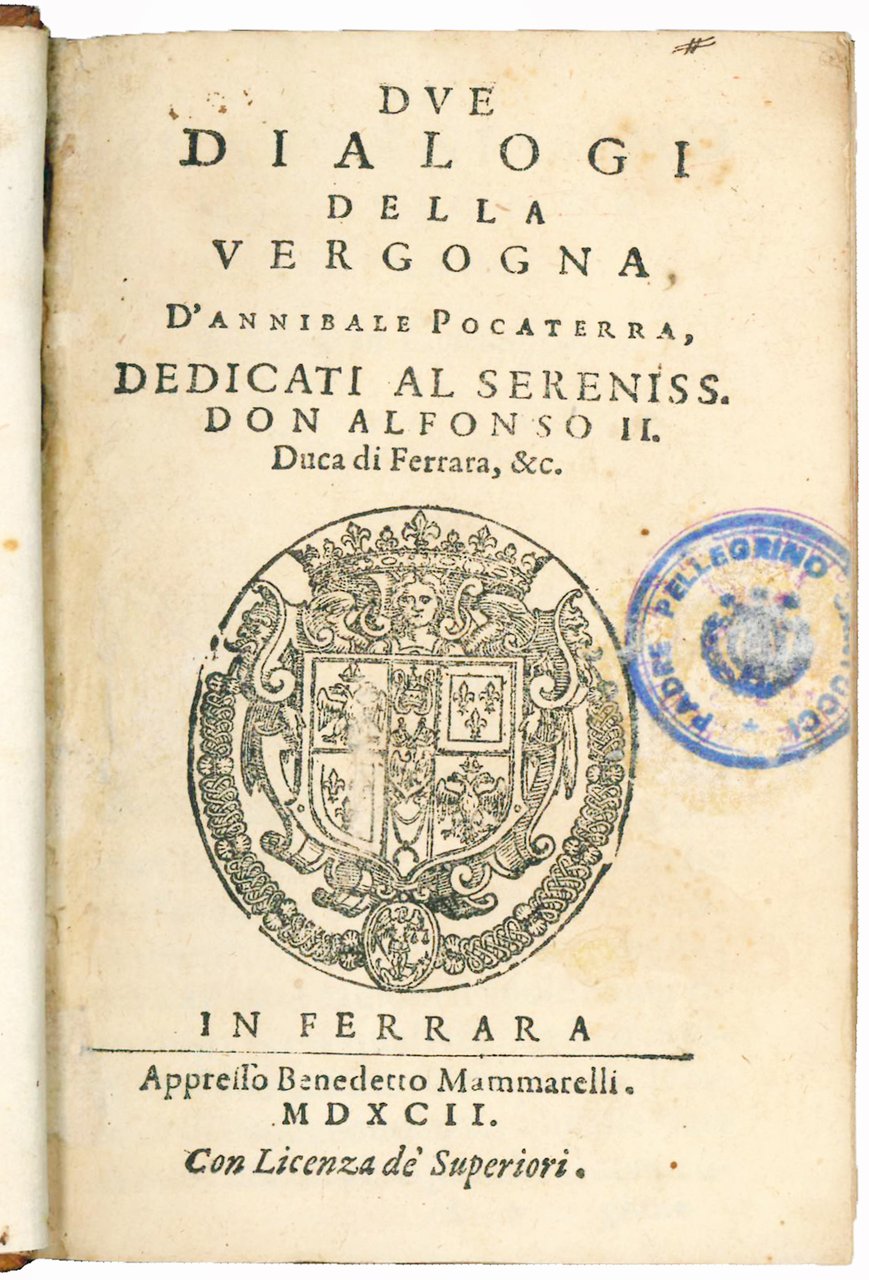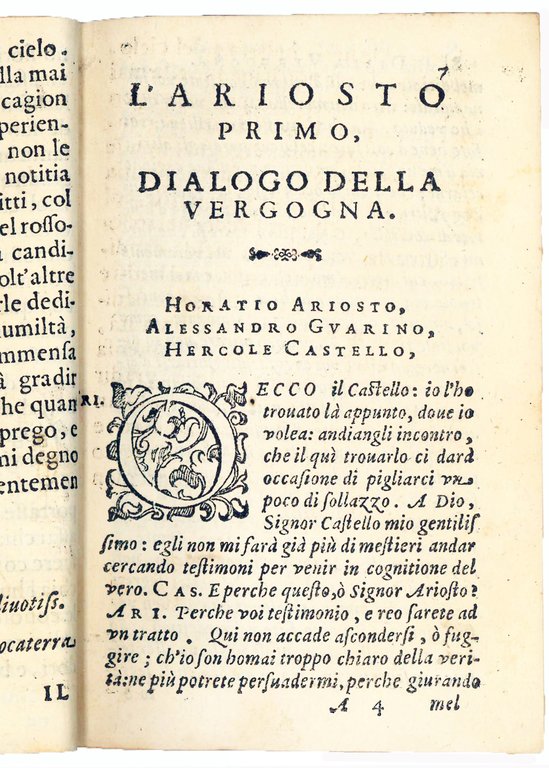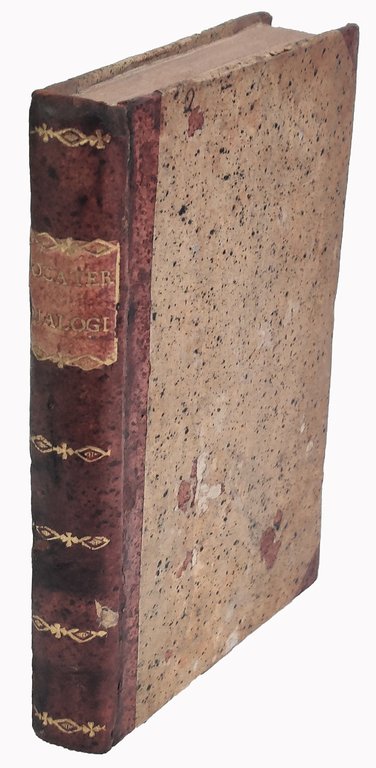


Libri antichi e moderni
POCATERRA, Annibale (1559-1593)
Due dialogi della vergogna
Benedetto Mammarelli, 1592
non disponibile
Govi Libreria Antiquaria (Modena, Italia)
Parla con il LibraioLe corrette spese di spedizione vengono calcolate una volta inserito l’indirizzo di spedizione durante la creazione dell’ordine. A discrezione del Venditore sono disponibili una o più modalità di consegna: Standard, Express, Economy, Ritiro in negozio.
Condizioni di spedizione della Libreria:
Per prodotti con prezzo superiore a 300€ è possibile richiedere un piano rateale a Maremagnum. È possibile effettuare il pagamento con Carta del Docente, 18App, Pubblica Amministrazione.
I tempi di evasione sono stimati in base ai tempi di spedizione della libreria e di consegna da parte del vettore. In caso di fermo doganale, si potrebbero verificare dei ritardi nella consegna. Gli eventuali oneri doganali sono a carico del destinatario.
Clicca per maggiori informazioniMetodi di Pagamento
- PayPal
- Carta di Credito
- Bonifico Bancario
-
-
Scopri come utilizzare
il tuo bonus Carta del Docente -
Scopri come utilizzare
il tuo bonus 18App
Dettagli
Descrizione
8vo (138x90 mm). 209, [30] pp. Collation: A-P8. Leaf P8 is a blank. With the woodcuts arms of Alfonso II, duke of Ferrara, on the title-page and the printer's device on l. P7v. Errata on ll. P6v-P7r. Register and colophon on l. P7v. 19th-century half calf, spine gilt with morocco lettering spine, sprinkled edges (rubbed and worn). Private library stamp on the title page, small repairs to title-page's gutter not affecting the text, some light browning and occasional foxing. All in all a good copy.
Rare first edition. The work was reprinted in 1607 with an anonymous biography of Pocaterra.
“The psychiatrist who listens in on Pocaterra's Dialogues is thrown into a heady experience not unlike that of an archaeologist who has stumbled into a treasure trove filled with artifacts that make us uncomfortable. It is a time capsule sealed in 1592, four centuries before the appearance of a readership ready and able to understand it. Books on shame are never easy to read simply because shame is the emotion responsible for privacy; within each of us, shame protects the borders of what we hide. In no era has a book on shame been easy to read. This one is not only the first ever written about shame, but a major, historically significant disquisition - a wide-ranging survey of embarrassment, humiliation, mortification, exposure, failure, and the experience of personal deficiency […] Pocaterra, in his insistence that shame is a personal experience of unique form, intensity, and importance, demands that we know and feel each aspect of his subject, that we ignore as little as possible of what has so occupied him. I must assume that the entire subject of shame has made him uncomfortable enough to challenge the revealed truths of his era, motivating the author to make us uncomfortable at a personal level so that we will share his concerns. We are presented with a Socratic conversation between the philosopher Horatio Ariosto and his romantic young friend Hercule Castello, with the equally aristocratic Alessandro Guarino taking the role of a foil, intelligent but speaking as an unsophisticated student whose naiveté helps reduce Castello's embarrassment. Ariosto is nothing like the kindly modern therapist who might offer to assist Castello by reducing whatever emotional pain he carries; in this situation he functions more like an anatomist dissecting the muscles of a living specimen in order to demonstrate them to a theater of students. The die is cast in the opening moments of their interaction: Exposing the latter's secret infatuation with a local woman of Ferrara, Ariosto teases, taunts, and humiliates his subject into a variety of reactions each of which is a somewhat different form of shame, and each of which will in turn be discussed in detail” (W. Gundersheimer & D. Nathanson, eds., Annibale Pocaterra, Two dialogues on shame, Wolfenbüttel, 2013, pp. 7-8; see also W.L. Gundersheimer, Renaissance Concepts of Shame and Pocaterra's ‘Dialoghi Della Vergogna', in: “Renaissance Quarterly”, 47/1,1994, pp 34-56; and G. Ricci, Annibale Pocaterra e i «Dialogi della vergogna». Per la storia di un sentimento alla fine del Cinquecento, in: “Alla corte degli Estensi: filosofia, arte e cultura a Ferrara nei secoli XV e XVI”, M. Bertozzi, ed., Ferrara, 1994, pp. 43-75).
“I try to imagine the course of Western philosophy and culture had not Pocaterra died so young, had he been given the opportunity to write the many books that would have burst from his fountain. What if Due Dialogi della Vergogna had gone through as many editions as the De civilitate Morum Puerilium of Erasmus or the Galateo of Della Casa? What if shame had been understood, accepted, re- spected, rather than increasingly secret and shameful? What would psychoanalysis and the entire men- tal health movement be today had Freud grow up with an awareness of shame as sophisticated as that of Pocaterra?” (D. L. Nathanson, Shame and Pride: Affect, Sex, and the Birth

